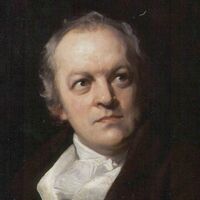Holy Thursday (from Songs of Experience)
Analysis
Holy Thursday is a poem by William Blake, first published in Songs of Innocence and Experience in 1794. This poem, unlike its companion poem in "Songs of Innocence" (1789), focuses more on society as a whole than the Holy Thursday ceremony.
The primary objective of this poem is to question social and moral injustice. In the first stanza, Blake contrasts the "rich and fruitful land" with the actions of a "cold and usurous hand" - thereby continuing his questioning of the virtue of a society where resources are abundant but children are still "reduced to misery".
"Holy" or "Maundy" Thursday refers to the Last Supper of Jesus and his disciples as recorded in the New Testament. One particularly significant episode during that event was that of the master's foot washing - an act which signified the utmost humility in service. English monarchs and the wealthy traditionally used this festival for symbolic acts of charity: with the complementary poem in "Songs of Innocence", Blake pictures such an act, of which he appears to approve, carried out in St. Paul's Cathedral. However, our appreciation of the "wise guardians of the poor" thus advertising their charity may not be wholly shared by Blake's "Piper", the supposed narrator of the "Songs of Innocence". In their state of innocence, children should not be regimented; rather, they should be playing blithely on the "ecchoing green". The children in this poem 'assert and preserve their essential innocence not by going to church, but by freely and spontaneously, "like a mighty wind," raising to "heaven the voice of song." '[1]
With his "Holy Thursday" of the "Songs of Experience", Blake's "Bard" clarifies his view of the hypocrisy of formal religion and its claimed acts of charity. He sees the established church's hymns as a sham, suggesting in his second stanza that the sound which would represent the day more accurately would be the "trembling cry" of a poor child.
The poet, as Bard, states that although England may be objectively a "rich and fruitful land", the unfeeling profit-orientated power of authority has designed for the innocent children suffering within it an "eternal winter". The biblical connotations of the rhetorical opening point us towards Blake's assertion that a country whose children live in want cannot be described as truly "rich". With the apparent contradiction of two climatic opposites existing simultaneously within the one geopolitical unit, we are offered a metaphor for England's man-made "two nations".
Blake wrote during the industrial revolution, whose pioneers congratulated themselves upon their vigorous increases in output. The poet argues that until increases in production are linked to more equitable distribution, England will always be a land of barren winter.



